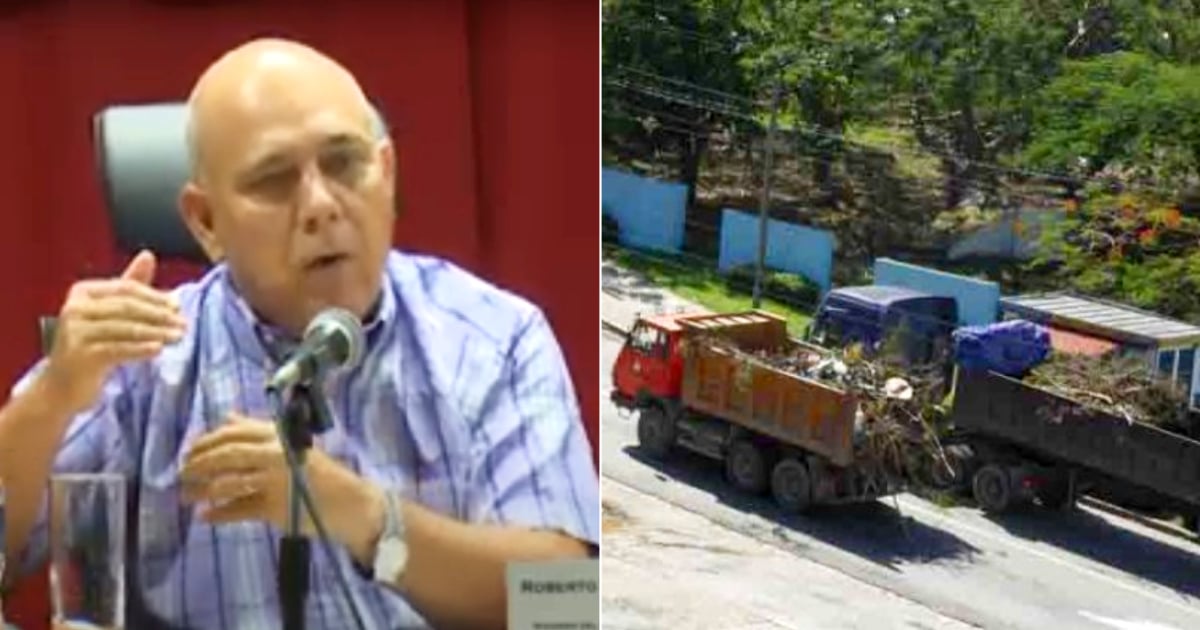The Secretary of Organization of the Communist Party of Cuba (PCC), Roberto Tomás Morales Ojeda, has instructed the residents of Cienfuegos to start cleaning and maintaining the city streets, which he found dirty and overgrown during his recent visit.
Presiding over the Plenary Session of the Provincial Party Committee alongside the head of state and First Secretary of the PCC, Miguel Díaz-Canel, Morales Ojeda emphasized the importance of mobilizing the population to "find solutions" to the regime's accumulating problems, which a report from the official PerlavisiónTV described as "times of evident difficulties."
"In Cienfuegos, we need to keep insisting on cleanliness. Cienfuegos has always been distinguished by its cleanliness, its culture of good taste, and attention to detail. Just now, we came from the airport with the secretary, and Avenida 5 de Septiembre—after a 5 de Septiembre—has overgrown areas. This requires mobilizing the grassroots, cleaning the gardens of the buildings, with the CDR, the Federation, the militants who live there…” Morales Ojeda reprimanded the local authorities.
Mobilizing for Local Solutions
In line with the directives of the "continuity" government led by Díaz-Canel, the communist leader called for finding local solutions to citizens' problems, a strategy designed in the Palace to "control damage" and shift responsibility for the well-being of the governed to local authorities.
"I insist, I said it before and I now repeat it: we must distinguish what are objective problems, what is fuel, what is something else we cannot resolve locally, and what is organizational, subjective, related to discipline, demand, and control," Morales Ojeda reiterated.
Lacking the knowledge and strategies to remedy and solve more than sixty years of failed policies that have led to the collapse of the communist system and its economy, the PCC leaders (the only legal party in Cuba) cling to their classic methods of "popular mobilization" and "voluntary work."
Unable to be efficient, even in such basic and elementary public services as Communal Services, the leaders of the so-called "revolution" appeal to the "consciousness of the working class" so that the exhausted and impoverished citizens perform the tasks the government cannot cover with specialized and justly paid labor, according to the nature of their work.
If the streets of Cuba are filled with garbage, the green areas of the cities are overgrown with weeds, or there is a lack of labor to harvest potatoes, the regime does not hesitate to mobilize its working class to take on the tasks that the centralized planning of the economy and society has neglected.
"Communist labor, in the strictest and most rigorous sense of the word, is labor performed for the benefit of society without remuneration... it is voluntary labor, labor outside of all norms, labor contributed without the aim of remuneration... labor performed by the habit of working for the common good and by a conscious attitude (turned into a habit) towards the necessity of working for the common good; it is labor as a need of a healthy organism," defined Vladimir Ilich Lenin.
Morales Ojeda, who has read a bit more than Díaz-Canel about the ideologue of the Russian Revolution, and holds the position of Secretary of Organization and Policy of Cadres of the Central Committee of the PCC, considers it necessary to return to the old communist manuals to "correct distortions and boost the economy."
Thus, he admonishes the people of Cienfuegos, who have lost their traditional "culture of good taste and detail," and urges them to take up machetes and tools to clear the green areas and bushes so that their city is presentable... for the next Plenary Session or government visit.
Key Issues in Cienfuegos and Communist Party Directives
In light of the recent orders from the PCC, it is essential to understand the underlying issues and directives affecting Cienfuegos and its residents. Here are some key questions and answers:
Why did Morales Ojeda order the residents to clean the streets?
Morales Ojeda observed that the streets of Cienfuegos were dirty and overgrown during his visit and emphasized the need for cleanliness to maintain the city's traditional standards.
What is the significance of "popular mobilization" in the PCC's strategy?
The PCC relies on "popular mobilization" and "voluntary work" as classic methods to address issues, reflecting their inability to efficiently manage basic public services and labor needs.
How does the PCC's strategy impact local authorities?
The strategy shifts the responsibility for solving local problems to the local authorities, aiming to control damage and manage citizen well-being more effectively.
